Soon – in just a few years from now – VW says it will only be selling electric cars. Right now it is one of the few companies selling cars, at all.
Most of the rest are selling almost nothing but crossovers and SUVs.
VW also sells a car – the Jetta – with something else that you can’t find anywhere else in a car like the Jetta.
That thing being a third pedal – and a clutch.
What It Is
The Jetta is a very affordably priced compact-sized sedan that can serve as a family sedan because it is almost a mid-sized sedan in terms of its interior spaciousness and the size of its trunk.
It is also the only sedan left in the class that is still available with a manual transmission – and not exclusively in the more expensive “sport” (GLI) version, either.
Prices start at $18,995 for the base S trim – which comes standard with a six-speed manual transmission an da turbocharged 1.4 liter four cylinder engine. You can opt for an eight speed automatic, which bumps the sticker price up to $19,795.
But you don’t have to.
The R-Line, which is fitted with larger (17 inch) wheels, dual exhaust tips. fog lights, piano black trim and an electronically controlled limited slip differential, is also available with the manual ($22,795) or the automatic ($23,595).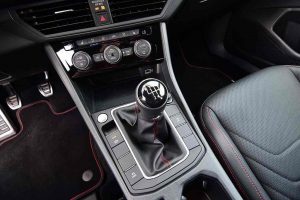
SEL ($25,745) and SEL Premium ($28,045) trims come exclusively with the automatic.
There is also the Jetta GLI – which comes with a larger 2.0 liter engine and either the six-speed manual ($26,345) or a seven-speed automated manual ($27,145) that has a clutch but no stick. These also get VW’s Digital Cockpit, which replaces the analog instrument panel with a configurable flat screen, along with a secondary LCD display for the infotainment systems.
What’s New
Base trims come standard with new two-tone wheels; SEL and higher get the latest version of VW’s MIB3 infotainment system.
The stick puts some fun back into driving. . . and some economy.
Nearly as spacious as more expensive (and automatic only) mid-sized cars.
Available with higher-end features for not as high cost.
What’s Not So Good
This is probably one of the last cars VW will offer with a manual transmission – or an engine, for that matter.
Top-of-the-line Beats radio is excellent, but the tap/swipe controls can be frustrating to use.
Some pushy “safety” systems (e.g., headlights-on when the car thinks they should be on).
Every Jetta except the GLI comes with the same 1.4 liter, turbocharged four cylinder engine.
It features and air-to-water heat exchanger (rather than an intercooler) and produces 147 horsepower and 184 ft.-lbs. of torque. That’s a bit less than what comes standard in other models in the class, like the Mazda3 – which comes with a larger, 2.0 liter engine that makes 150 horsepower and which you can order with an even larger, 2.5 liter engine that makes as much as 250 horsepower. But you can’t get any of the Mazda’s engines with anything other than an automatic transmission.
It’s the same as regards the other big kahuna in this class, the Honda Civic sedan – which is not only automatic-only it is CVT (continuously variable transmission) automatic only.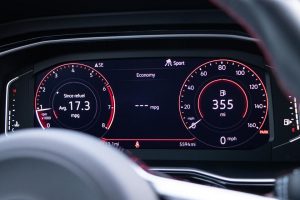
Many people who don’t mind automatics do mind CVT automatics – which can be noisy, sometimes don’t feel “right” and have a not-so-great track record for being less reliable than conventional automatics that shift through gears rather than vary through ranges.
The Jetta’s standard – as well as available (in more than just one trim) manual transmission also lets you make the most of the power the 1.4 liter engine produces since you control the shifting, not a computer.
Interestingly, the manual-equipped Jetta rates higher gas mileage numbers than the automatic (and CVT automatic) only competition, a very impressive 30 city, 41 highway. This is also as good as and even better than the mileage figures posted by many subcompact-sized economy cars; for example the current Hyundai Accent sedan, which rates 29 city, 39 highway with its six-speed manual transmission.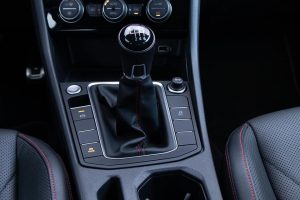
Also interestingly, the manual-equipped Jetta’s mileage numbers are higher than the automatic-equipped Jetta’s rated 29 city, 39 highway.
What makes this even more interesting is that manual-equipped Jetta saves you money as well as gas.
You pay $800 more up front – which means (if you buy this version of the Jetta) you’ll have $800 more in your pocket to spend on gas. Since the Jetta takes about 14 gallons of gas, that amounts to about 20 tankfulls of gas (at $3 per gallon) that didn’t cost you anything extra.
The manual is also less likely to cost you extra down the road – because manuals tend to last longer than automatics (and CVT automatics) which is a function of the manual transmission being a simpler, mechanical device without a lot of electronic devices attached to it. 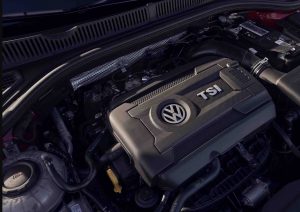
And if you want a lot more power, there is always the Jetta GLI – which comes with a 2.0 liter, 228 horsepower turbocharged engine.
The six-speed manual is – of course – standard. Optional is a seven speed automated manual.
But the bottom line is, if you simply prefer to shift for yourself, the Jetta is in a class by itself.
On The Road
Cars have never had as much power – and been so lacking in personality – as they are today. Put it in drive – push down on the gas pedal . . . and try to stay awake.
Electric cars will accelerate this process because they don’t have engines or transmissions. They have electric motors. And motors are fundamentally all the same. No more difference – as between an in-line and a flat four; a V6 and a V8.
Instead, a shaft that spins inside a housing. Bigger or smaller. The power output varies but their characteristics not much. And in electric cars, the motors usually drive the wheels directly, without any intermediary – without a transmission of any kind – so there’s nothing much for the driver to do except increase or decrease speed, like a you do with a variable speed electric drill.
It is almost a shock to see a shifter – not a gear selector (lately, a button of some kind that you push) standing proudly at attention in between the seats. And it is a reminder – once you’ve fired ‘er up and are shifting through the gears, yourself – how fun it is to drive when you have something to do, besides put it in Drive and push on the gas pedal.
It is particularly fun in a car with a small engine that makes whatever power it makes at higher RPM, because you can more finely control the engine – revving it into and keeping it within its powerband. And with this particular engine, you also have an abundance of low-end torque because of the close-coupled turbo, which breathes life into the little engine such that its peak output of 184 ft.-lbs. is at your command at just 1,400 RPM. You have to drive the Jetta to appreciate what the numbers don’t convey.
It punches above its weight.
It also gets even better gas mileage than the numbers say.
This, too, is something you have to drive to experience – and believe. If you know how to shift, you can exceed the advertised 41 MPG on the highway. I know because I did. Not hugely, but still. It’s damned impressive. This car achieves near-hybrid highway mileage without the hybrid’ing.
I’s also a lot of fun!
There is another item worth mentioning about driving the Jetta, which is the view from behind the wheel – which is expansive, because of the Jetta’s long but downward sloping hoodline. The road ahead is much more “there” – and that makes dancing through the curves even more fun.
That’s the standard Jetta with the 1.4 engine. With the GLI engine, you can also make tracks in the straights – while chirping the tires on the upshifts.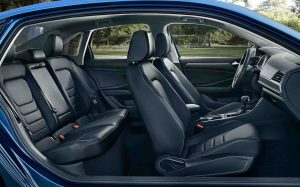
At The Curb
By the numbers, the Jetta is a compact-sized sedan. Well, by some of the numbers.
It is 185.1 inches long, which is about the same length as rivals in the class like the Mazda3 sedan (which is 183.5 inches long). But have a look at some more relevant numbers:
The VW has 37.4 inches of backseat legroom and a 14.1 cubic foot trunk – as opposed to the Mazda’s 35.1 inches of backseat legroom and its 13.2 cubic foot trunk. The Honda Civic – which is smaller overall than either of them – has a little bit more backseat legroom (37.4 inches) and a slightly larger (15.1 cubic foot) trunk but it costs significantly more ($21,050 to start) and it costs you the fun of shifting for yourself.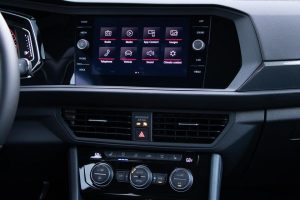
The more relevant statistics stack-up may be Jetta vs. a Toyota Camry, Honda Accord or other mid-sized family sedans. The Camry, for instance, is a much larger car – in terms of its length (192.7 inches) but not appreciably more spacious inside (38 inches of backseat legroom) and has a trunk only nominally larger (15.1 cubic feet). But the Camry’s base price is $25,045 – which amounts to a difference of $6,050.
Now, the Camry is a very nice car. There is a reason it has been one of the best-selling cars, ever. But this Jetta makes a very persuasive case for itself, if you’re looking for a more affordable car that’s not a much smaller car – and that’s also a more fun-to-drive car than an automatic-only car like the Camry (and Accord, which is no longer offered with a manual, either).
The Jetta also offers some expensive-car amenities in a less expensive package. For example, the full LCD Digital Cockpit, which include both the main instrument panel and the secondary panel for the (excellent) 400 watt, 9 speaker Beats audio system – both of which you can get in the more affordable SE and R-Line trims as opposed to being limited to the more expensive SEL and SEL Premium. And even those trims both sticker for well under $30k, which is about $5k less than the average transaction price paid for a mid-sized family sedan like the Camry or the Accord.
Of course, like all new cars, the new Jetta comes standard with pretty much every amenity and feature that is necessary for civilized driving, including (of course) AC, power windows and locks, plus modern necessities such as multiple USB ports, Bluetooth wireless and a good stereo to play your music through, wirelessly.
But what makes it exceptional is how inexpensive it is – and how much more fun it is, for less than the rest.
The Rest
VW is generally good with regard to ease-of-use of controls and there are easy-to-use knobs for things like the climate controls, volume control and the radio tuning control. But in the case of the higher trim Jettas with the Beats system you have to work your way through a Byzantine touch/tap/swipe system that’s not the easiest-to-use until you get used to using it and even then, it could be easier to use.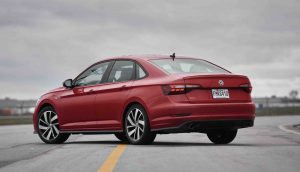
Technology can dazzle in the showroom but it sometimes doesn’t work as well as simpler, if less dazzling, technology – like a knob you turn or a button you push. On the other hand, the glass-facing is handsome and the ability to shift for yourself, priceless.
The Bottom Line
VW won’t be making cars like this Jetta for very much longer and almost no one else is making them, right now.
So if you’d like to own a new car like this before they stop making cars like this, make a beeline for the last place that’s still selling them.
. . .
Got a question about cars, Libertarian politics – or anything else? Click on the “ask Eric” link and send ’em in!
If you like what you’ve found here please consider supporting EPautos.
We depend on you to keep the wheels turning!
Our donate button is here.
If you prefer not to use PayPal, our mailing address is:
EPautos
721 Hummingbird Lane SE
Copper Hill, VA 24079
PS: Get an EPautos magnet or sticker or coaster in return for a $20 or more one-time donation or a $10 or more monthly recurring donation. (Please be sure to tell us you want a magnet or sticker or coaster – and also, provide an address, so we know where to mail the thing!)
My eBook about car buying (new and used) is also available for your favorite price – free! Click here. If that fails, email me at EPeters952@yahoo.com and I will send you a copy directly!


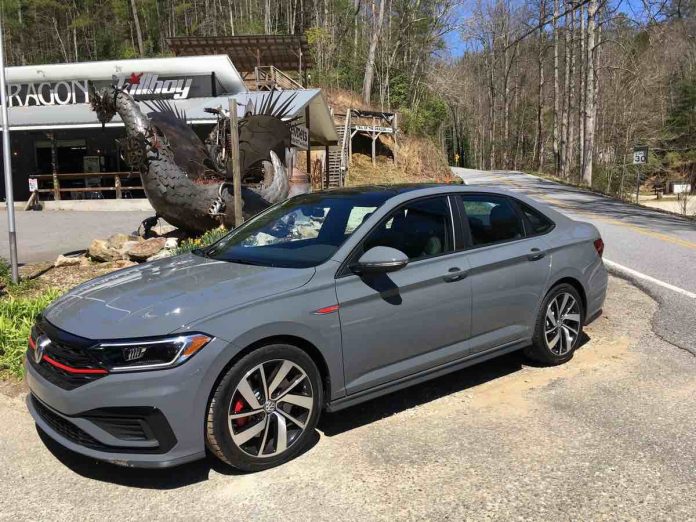

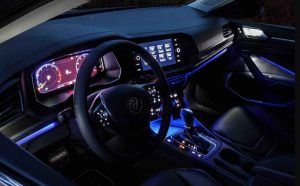
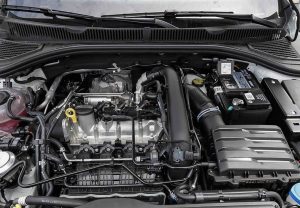








Eric,
Thanks for the interesting article.
My family had 4 ea. MK4 Jettas (1999.5-2005) at various times and I grew to really like driving them. They held the road well and also had impressive stopping capability. I still have my daughter’s red 2000 Jetta (the first of our Mk4’s)…it’s a fun car to take out on the road!
On a serious note: VW and AUDI are going all in on electric vehicles and jettisoning the internal combustion engine? This is quite bizarre…everyone will be forced to purchase electric cars, but nobody will be able to charge them for use.
The same globalist bureaucrats that took away the 100 watt light bulb now want the world to get rid of gas/diesel and go all in for the electric vehicle. This equals less freedom to travel, with more restrictions.
My family has two Jettas: ’14 sportwagen (2.5L 5 cyl) and ’16 sedan (1.4L turbo 4 cyl). Both w/5spd. The ’14 has 126k and the ’16 has 50k. Haven’t put a penny into either car, both bought new. Spark plugs easy change; sit right on top. Serpentine belt still good on the ’14, no cracks. Only have replaced tires and brake pads. Great handling on both cars. Both have a lot of room, esp the sedan with the trunk and pass-thru back seats. The 2.5L gets about 33mpg, but the 1.4 L routinely pushes 39 in city, and almost 42 highway. (keeping it under 80) I think the gearing really helps, b/c both cars at 70mph are turning just under 2000 rpm.
I would buy another VW in a minute. The 1.4, 1.8 and 2.0 turbos are all good engines. And the 2.0 non turbo is consistently ranked as one of the most troublefree engines ever built by VW. (but weak on power)
That’s encouraging. I have always liked VWs. How are they on highway noise? My priorities are gas mileage and quiet, assuming performance isn’t too bad. As long as a car can accelerate from 0-60 in around 9 seconds or less, that’s all I really need.
I rented a 2006 Jetta and loved the way it drove. It seemed bullet proof and solid at speed.
I almost bought a 2013 Jetta GLI and was tempted again in 14. Unfortunately, I din’t want to sign up for a car note, so kept driving my 2010 Subaru Legacy. I hated that car and ended up selling it and buying a used Lexus ES300 for the same money as I got for my Legacy that had 160,000 miles.
I think that if you maintain a VW, it won’t crap on you, but if you don’t keep up with it, you will end up at the side of the road. It’s slightly different from driving a Lexus or a Toyota.
I heard that these cars while nice, fall apart after a few years with plastic bits falling off and electronics failing. Otherwise, I would have bought one. I could use the long range and great mileage that these cars allegedly get.
Eric – how fast were you traveling on the highway to achieve 40 mpg out of a GLI? That’s insane.
We have a 2018 Sportwagen manual (a close cousin to the Jetta) and it gets 45+ MPG on the highway @ 70. It held 40 MGP until 85 MPH on a road trip . . . it falls off pretty quick after that. But my, it is smooth at those speeds! And looks great . . . and holds a ton. We love everything about it.
Slightly off topic – but I finally saw a review of the car that caused them to crucify VW…
https://youtu.be/ozqSdnkYxJM
250 MPG from a diesel car….imagine the freedom this technology would give a person….. it had to be stopped. it is a shame because always saw VW as a company which used its energy and resource to make cars which benefited the common guy… their flagships were always practical vehicles, rather than the extremely expensive supercars for the poster on a bedroom wall most companies tend to focus on.
Now if this thing was made at scale, and prices came down over time with mass production, imagine how much freedom and mobility this sort of thing can give an average person…. and ofcourse this is exactly what they dont want!!
Indeed, Nasir –
A 250 MPG car (with a 10 gallon tank) that could have been sold for less than $30k. Most people would have need to fill up once every other month, maybe – or even less.
It had to be stopped, indeed.
This is such a rare car – ive never seen one, have you Eric ? Not sure if you watched the video, but on a serious note before this crap started I always felt (as Doug mentioned) to keep something like this, an ultra efficient city car for the daily commute with a sporty car for the weekend/evenings. This was ofcourse before I realised where they are pushing us and Ive made it a point to drive the funnest thing I can whenever I can 😀 As always government regulation has led to the opposite of what was intended!!
I’m highly dubious of the claim of 250 mpg, unless remarkable advances have been made in overcoming wind resistance, road friction, internal friction of moving parts, and, most important, something like an ADIABATIC diesel engine, that is; the materials are sufficiently resistant to the heat of combustion and have acceptable wear characteristics that the parasitic loss of heat out the engine block and heads is practically eliminated. Such an engine should also had the benefit of not requiring a cooling system, cutting weight, the power loss of a water pump, and not disgorging useful heat out the radiator.
However, even if this rig gets, say, 75 mpg, there will be forces that will stop it. Think of Preston Tucker and his Tucker 48.
I rented a diesel Polo the last time I was in Italy. Drove it all around for nearly 2 weeks, averaged well over 80 MPG and I am no featherfoot. When C&D magazine tested the TDI Golf the said “This is the car that will trailer the Hybrids” From that day on I knew their days were numbered, the PTB could not allow this to happen and derail 4 decades of careful work.
If they could do it to Preston Tucker and his Tucker ’48, they could do it to ANYONE.
This looks interesting. Hopefully there will be some manuals available at dealers. I’m glad to see that Honda is still offering a manual on the new Civic Hatchback. It’s a non turbo engine to boot. Looking forward to your review of that when you get one.
‘Every Jetta except the GLI comes with the same 1.4 liter, turbocharged four cylinder engine.’
Translated into Oldspeak, 1.4 liters is 85 cubic inches — much smaller, for instance, than the puny 144 cubic inch Mileage Maker straight six that graced the original Ford Falcon econobox.
But technology has changed. Turbocharging wrings 1.73 horsepower per cubic inch out of the Jetta’s tiny four, whereas Ford’s 1960 carbureted offering (which my sixth-grade teacher derided as ‘about the size of two matchboxes’) achieved a feeble 0.66 hp per cubic inch.
How ironic that internal combustion engines are being politically obsoleted, just when they’ve reached a rather thrilling level of specific output.
Imagine — free your mind of computerized black boxes and their menacing octopus tentacles of wires — that robust Jetta engine plunked into a tiny, bantamweight sports car like a bug-eyed Sprite, giving it an extra 104 horses over its original 43 hp. Its 20.5 second 0-60 mph time would be slashed by about 75%.
Oh my … me want one!.
None of this anachronistic fever dream is either technologically possible or politically legal anymore.
But if they kill our dreams, what’s left?
Excellent point, Jim.
Back in the day, though, turbocharging was considered “exotic” and expensive and something that most customers weren’t willing to spring for. In 1960, when the Falcon made its debut with the 144 CID “Thriftpower” Six (yep, 2.2 liters in modern geekspeak), putting out a whopping 80 ponies, all one could get for a limited amount of extra “oomph” was the 170 CID Six with 100 ponies. The Windsor V8, introduced for the mid-sized Fairlane and Merc Meteor for ’62, originally in 221 CID (Buck and Pontiac also had those “teeny-tiny” V8s, what was with that?) and later the 260, wasn’t available until late in the ’63 model year. The American public wanted QUIET, torquey engines, so the slow-turning V8s were the way to go, and likewise turbocharging and exotic valve trains like Dual Over-head cams (think of Ford’s 427 “Cammer” engine) were the stuff of very limited production specialty makes, more as advertising and publicity stunts on the racing circuits.
Don’t also be fooled by those hefty horsepower figures. TORQUE is what gets your ride off the line. True, torque output is very respectable, too, but as for that Jetta’s 1.4L turbocharged four, you can get the most out of it ONLY when you’re well-exceeding the speed limits. Not that I would mind doing THAT….
Hello cousin Doug,
Torque. 1970 Buick GS Stage 1, 510 ft. lbs. Torque.
Eric,
I realize you’re partial to Pontiac, (don’t get me wrong, I dig Pontiac’s), and the 455 in your car. What do you think of this 455?
https://musclecarsillustrated.com/1970-buick-gs-stage-1/
Look up the Buick XP-300 engine from their show car of the same name. Hemi-head, domed pistons, supercharged, 4 x 2 barrel sidedraft carbs, based on the nailhead engine.
Morning, William!
I respect the heck out of the Buick 455, especially the Stage variants – some of which produced in the neighborhood of 500 ft.-lbs. of torque with a relatively mild hydraulic cam and – in a GS Regal – delivered some of the best quarter mile times of any stock muscle car of the classic era.
Plus, they were beautiful cars!
I’m surprised that the Buick 400 and 455 weren’t available in GMC trucks, with that torque output.
Any word of a Sport Wagon version?
Eric, your review of the 2019 Jetta convinced me I wanted one. I bought it in August of 2019 and love it. Mine is a 6-speed manual in the least expensive trim. It sounds like the current model is very similar. I leave the digital readout on life-time average gas mileage all the time. Mine is 42.7 mpg.
In April of 2020 at the best possible time when the price of cars had bottomed out, my sister bought a 2014 Passat TDI automatic. It only gets about 39 mpg. That diesel low-end torque on her car does make it fun to drive—at least upon launch. Not quite as much fun to drive as my manual, though.
Excellent, Jetta Guy!
These are such great cars; which is why it so tragic that VW is abandoning them in favor of electric cars that can’t compete with them on affordability, legs or just plain fun. If EVs ever become the only cars we’re allowed to drive, I’d stop driving – which is of course what these SOBs are after, anyhow.
so disappointed in VW.
They make decent cars, but gave in soooo easily to the buffoons over the emissions “scandal”.
Now on to EV land.
Looks like a VW will never again disgrace my driveway
My #2 son bought a 2020 Jetta GLI about a year ago with the manual gearbox, he LOVES it. What’s interesting is that, IMO, this isn’t a “family sedan”, but it’s larger inside than the Toyota Corolla and certainly than my old 2014 Ford Focus was. I drove it for the first time when I last visited him, we took a “day trip” from his home in Henderson NV down to Laughlin and I drove it on the way back. Like the way it handles, and it has the best combo of old vs. new tech…yeah, there’s the mirror warning lights, and the E-brake, but the stick shift lets you actually DRIVE this rig. Pickup is decent, ride is smooth and quiet, and, as with the 2003 Jetta the lad bought used in ’07, build quality is top-notch, as with any “Goiman” (German) product, as the “Sham-Wow!” guy touts. I don’t recall if this thing was assembled at Wolfsburg or in their TN plant where they’ve built “Wabbits” and Golfs for a long time.
Check the VIN, if the first three are WVW, it’s Deutschland, if they’re 3VW, it’s Puebla, Mexico, if 1VW, the former Volunteer Ordinance Works in Chattanooga Tennessee, USA (or if it’s old enough, that Wabbit plant wherever it was in the US, Westmoreland PA?). Oh yeah, or maybe if it’s a Brazilian VW, 9BW. Funny thing, some of the Diesel Golfs sold in the US aroun 2004 were assembled in Brazil. I had one of those. All had the same high build quality, as far as I have seen at least, except maybe the 70’s US Rabbits, I’ve never seen one of those myself.
We have a MkIV Jetta GL, base 2.0L naturally aspirated, 5 speed stick, that’s 18 years old now. Plain as can be but it just keeps ticking over. We love that little sportwagen!
We also love out A5 platform JSW. Excellent car, nearly perfect. Another example of Uncle killing good things, the 2.5L 5-cylinder in our JSW was VW’s answer to the Slant Six in terms of ubiquity and reliability. Excellent family car engine. It’s gone, in favor of 1.4L turbo fours. How long will that little 1.4 last?
One problem with this new Jetta for me, VW had really nice German understated styling up till now. This 2021 Jetta isn’t full Angry Samurai, but it’s getting there. I prefer the tight Teutonic lines of the A5 and even the MQB platform VW’s to this new one. Your A4 Jetta is an example of true VW styling, very nice IMHO.
Unfortunately, the car comes with a Sale Killing (for me) electric handbrake. I have almost exclusively owned VAG products since the 60’s but the electric future to which VW has committed means they will either be out of business or maybe purchased by a company such as Apple. I hope I will be able to keep my 2017 S1 and 2018 Transporter alive until I die because I cannot see buying another VW Group car again.